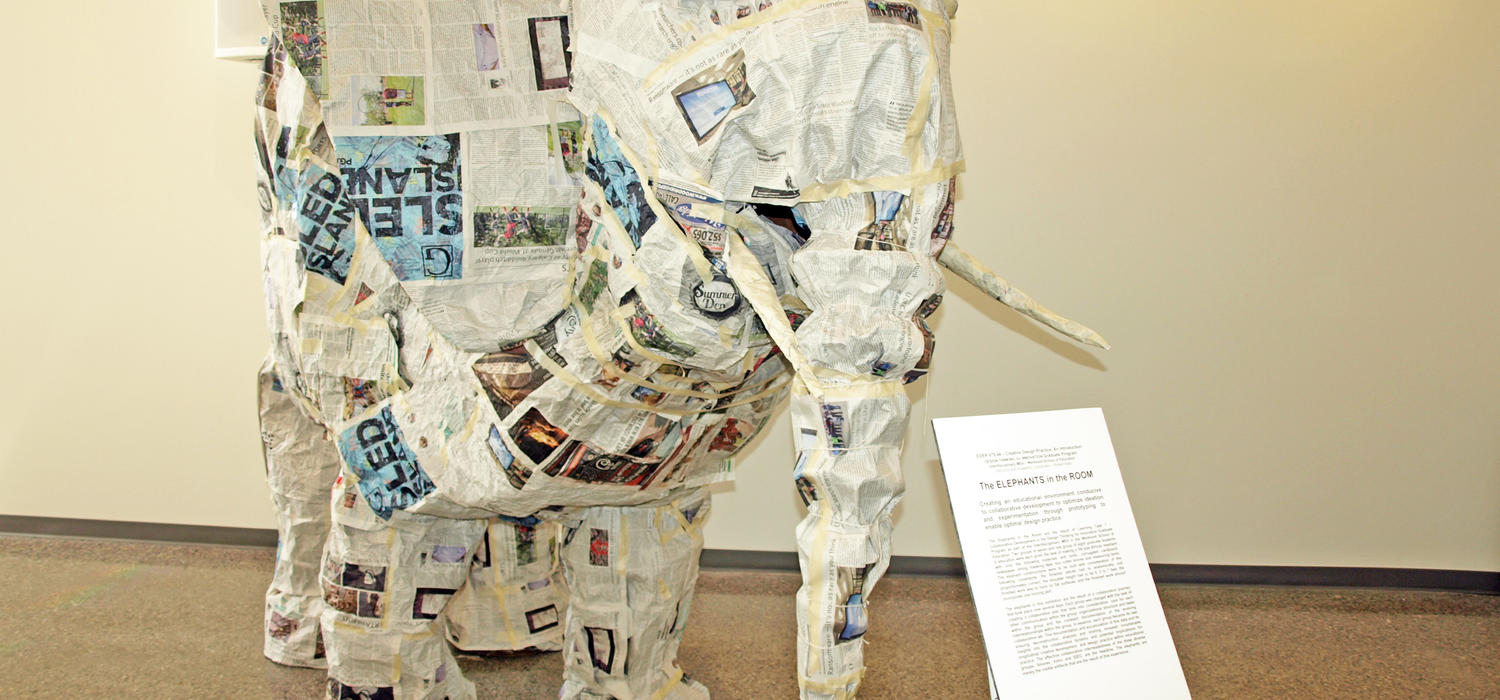Oct. 5, 2016
Elephants in the Room

Two life-size African elephants made of cardboard, newspaper, string and masking tape stand as bookends to a third elephant that rests on the floor of the gallery in the Taylor Institute for Teaching and Learning. The installation is the culmination of Robert Kelly’s Creative Design Practice graduate education course and while some might dismiss the project as simply arts and crafts, Kelly says there is deep learning involved in the endeavor.
“The title ‘Elephants in the Room’ can be interpreted as a metaphor in learning and teaching for a preoccupation with product over process. This activity is an example of how I enable collaborative development and ultimately a collaborative culture of creativity whether it is in education, healthcare or business,” says Kelly.
Kelly is an associate art professor in the Faculty or Arts and adjunct professor and academic coordinator of the Design Thinking for Innovation and Creative Development in Educational Practice graduate program in the Werklund School of Education. He explains that collaborative development is an essential foundational premise to enable creative development and design practice and that this assignment provides students with a hands-on opportunity to experience these concepts.
“Each group was given the task of developing a collaborative plan that encompasses tactics and strategies for collective research, communication, organizational structure development, task completion and meaningful inclusion and validation of each group member.”
The group creations were required to be proportionately and anatomically correct, have no flat surfaces, one moving part and a minimum shoulder height of two and a half metres. Kelly says he initially devised the activity through first year design courses in the Department of Art and specifically chose an elephant because he felt it would appear daunting at the onset, necessitating true collaboration.
“People see the elephants but the design challenge could have been to build a vintage Volkswagen Beetle or life-size orca whale. The elephant is the resultant artifact of a learning task that focuses on collaboration”
Rob Burton, who recently completed the program, says he is excited to implement what he learned with students in his own classroom.
“The processes I learned on collaboration, ideation and inspiration were just invaluable; it’s been a mind-blowing couple of weeks. I think we all gained something that we are going to bring back to our own practices.”
Applying the lessons learned in real world design contexts is exactly what Kelly hopes his pupils will do. Former student Teena Dickerson found success with the Art Cart project she created through these graduate courses. The program, which gives art supplies to patients recovering in Red Deer area hospitals in the hopes of providing inspiration and diversion, has distributed nearly 500 kits to date and Dickerson has been acknowledged with a Mayor’s Recognition Award for Community Builder.
Kelly’s most recent book, Creative Development: Transforming Education through Design Thinking, Innovation and Invention came about as the result of his teaching and learning research in creative development and design thinking as well as the development of the graduate programs in Werklund and experimentation in design classes in the Faculty of Arts.
The book forms the basis of a workshop series Kelly will be offering through the Taylor Institute beginning in October. Kelly says the series is designed for any faculty from any discipline in the university environment wishing to build creative practice and design thinking into the fabric of their courses.
"Equipping educators with the disposition of design gives them the creative design potential to meet any educational challenge, while personalizing learning experience design to suit the developmental need of the learner."
The free workshops will be held Tuesdays during the lunch hour over a period of five weeks. Registration is now open.
